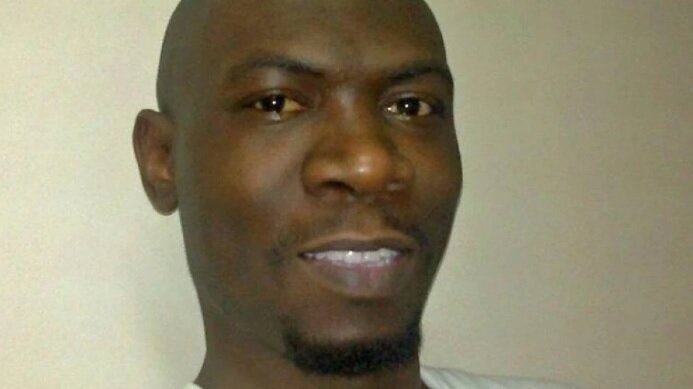Blood money: Kenyan facing execution in Saudi Arabia gets one-year reprieve

Mr Stephen Munyakho who is facing execution sentence in Saudi Arabia. Courtesy photo
The family of a Kenyan national who was facing execution in Saudi Arabia after being sentenced to death by hanging can now breathe a temporary sigh of relief after the government secured a one-year postponement of his execution.
The unexpected extension comes as a result of efforts by Kenyan authorities and advocacy groups working to intervene in her case.
In a statement on Thursday, Foreign Affairs Principal Secretary Korir Sing'oei said the government had negotiated with its Saudi counterpart and secured a one-year reprieve for Stephen Munyakho (alias Stevo), who was sentenced to execution in April 2011 after being involved in a fight with a colleague who later died of his injuries.
“I am pleased to inform that after strenuous negotiations between our Mission in Riyadh, Saudi Authorities and the Widow, the impending execution of judgment against Stephen Munyakho (Abdulkareem) due for November 26, 2024, has been postponed for another one(1) year to allow parties settle outstanding obligations,” PS Sing’oei said.
He added that the government shall continue relying on “our two countries' cordial relations towards concluding the matter. The goodwill of all Kenyans, partners, and stakeholders is equally appreciated. I commend Ambassador Ruwange for his leadership on this important matter”.
Mr Munyakho 50, was due to be executed in a months’ time for the murder of a Yemeni man in 2011. According to the Sharia Law, the execution could have been carried out by decapitation, while beheading is the most common method in the kingdom or by hanging, lethal injection or firing squad.
Since the imminent execution of Mr Munyakho was made official as per sharia law by the Saudi Arabia government, his has been fundraising for nearly Sh150 million to rescind the execution.
The troubles facing Mr Munyakho started in 2011 when he had an altercation with Abdul Halim Mujahid Makrad Saleh whom he worked with in a warehouse.
An alleged scuffle would later lead to the death of Halim and years later, Mr Munyakho was found liable.
The Yemeni family from the deceased side had initially demanded Sh400 million compensation but the exchange deal was later scaled to Sh150 million.
This is not the first time the family has had a reprieve, In May 2024, the family the family got a stay of execution which was temporary - and her mother Dorothy Kweyu, 73, at the time said that she was yet been given any further details about her son’s case by the Ministry of Foreign Affairs.
At the time she was still trying to raise the “diyah” or blood money that under the Islamic legal system, known as Sharia, would secure a pardon from the victim’s family.
Ms Kweyu says Mr Abdul, who stabbed her son in the thigh and thumb during the scuffle, walked himself to hospital where later died.
He was initially jailed for manslaughter but the dead man’s family successfully moved to the Shariah court, appealed and were successful. That saw an upgrade of the charges to murder.
Mr Munyakho was to die by the sword in 2014 when the appeal succeeded, but it happened that one of Mr Abdul’s children was only five years old. All the children have to consent to that form of justice. The family had to wait till the child turned 18 to give his consent.
The child has since hit 18. However, during that wait, negotiations happened and the family agreed to take money in exchange for not having him executed.
“It [waiting for the minor to reach 18] bought us time and we thank God for that,” said Ms Kweyu.
Under Islamic law, diyah compensates a victim or their family. It can be paid for a variety of crimes from murder to injury and damage to property.
It can lead to a reduction in sentence and in certain circumstances a pardon. It is currently applied in about 20 countries in the Middle East and Africa, including Sudan and northern Nigeria.
The Qur'an, the Muslim holy book, supports the paying of blood money--and this was further clarified by the Prophet Muhammad, who explained in his teachings that the price for murder or manslaughter should be 100 camels.
Modern interpretations mean this amount differs in different countries as diyah is now usually paid in cash.
Mr Munyakho moved to Saudi Arabia in his early 20s and has been held at Shimeisha Prison in Mecca for the last 13 years.
During an appearance in the Senate in July 2024, Prime Cabinet Secretary Musalia Mudavadi said the government had no budget allocation to settle the blood money for Mr Munyakho.
